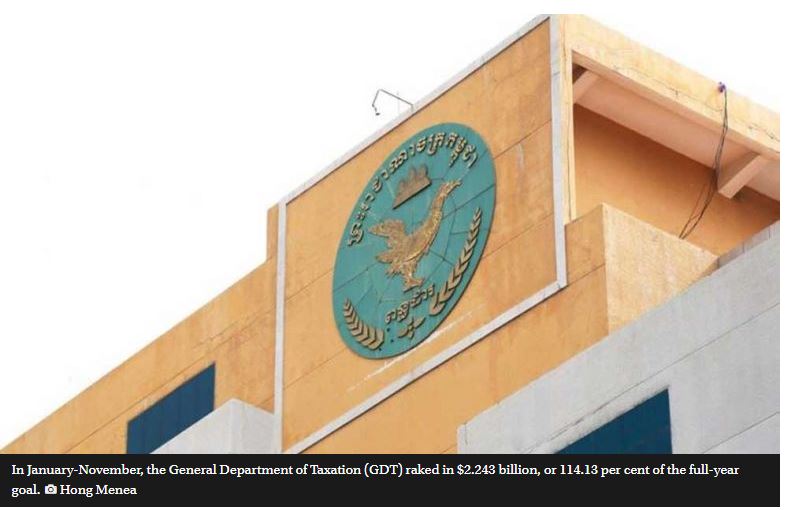Cambodia: E-commerce VAT from April 1: GDT
The government will start implementing the e-commerce value-added tax (VAT) from April 1, as the General Department of Taxation (GDT) updates a variety of technology systems for taxpayers.
Eng Ratana, director of the Large Taxpayer Department at the GDT under the Ministry of Economy and Finance, on January 18 spoke at an online seminar on “Applying Value Added Tax to E-Commerce Transactions”.
He said mainstreaming the knowledge of taxpayers regarding the implementation of VAT is very important complement to the 2019-2023 revenue collection strategy.
The government incorporated a policy into the strategy to avoid – to the fullest extent practicable – increasing tax rates or creating new taxes through the strengthening of existing tax laws or regulations, or enhancing the management of tax revenue collection, he added.
“The value-added tax obligation for e-commerce was announced by the General Department of Taxation through Instruction No 20522, dated December 08, 2021,” Ratana said.
Anthony Galliano, the group CEO of financial services firm Cambodian Investment Management Co Ltd, told The Post that retail sales globally are transforming from bricks and mortar to online e-commerce shopping.
“The growth is both exponential and phenomenal, and the trend is likely is accelerate. Looking back only to 2015, e-commerce share of total global retail sales was just 7.4 per cent, in 2021 it is now 20 per cent, jumping to $27 trillion.
“The General Department of Taxation is absolutely correct to implement VAT on e-commerce transactions and I am encouraged that new sources of tax revenues are being sought rather than exacting additional tax from the existing base. As tax revenues diversify, hopefully audits will abate,” he said.
It is an increasing global trend to implement goods and services tax (GST) and VAT taxations on foreign digital suppliers who are to become liable for the collection and remittance of this tax, he explained, underlining that Cambodia should be no exception.
He opined that any business which sells goods within Cambodia, and such good or service is consumed in the Kingdom, that good or service should be subject to VAT, whether the business is resident or now.
Otherwise tax revenue is leaked and local registered businesses that offer the same good and service as the non-resident business, would be disadvantaged, there must be a level playing field, he said.
“I don’t believe the introduction of VAT to non-resident taxpayers who provide supplies of digital goods or services, or e-commerce activities from outside Cambodia to customers in Cambodia will in any way curtail the growth of e-commerce in Cambodia.
“The challenge is registration, implementation and execution as well as raising awareness of this new tax to non-resident suppliers and educating the local consumers to impose the tax and collect. I believe the delay is at least partially due to not being ready at this stage,” Galliano said.
Cambodian tech and digital businesses achieved $470 million in revenue for 2019, the Asian Development Bank (ADB) reported late in May.
Broken down by sectors, e-commerce accounted for 27.6 per cent, e-services 7.8 per cent, digital media 10.2 per cent, advertising technology 12.7 per cent, transportation 3.8 per cent and online travel 37.9 per cent, the Metro Manila-based multilateral lender said
In a December 1 statement, the Ministry of Commerce had warned enterprises, sole proprietorships, legal persons and affiliates of foreign companies that do business electronically in the Kingdom to start the application process for the pertinent e-commerce licences and permits on or before March 1, or face possible legal action.
Aiming to protect Cambodian consumers, the statement extended a previous deadline, and came amid a notable rise in businesses filing documents with the Ministry of Post and Telecommunications for the relevant licences and permits, following similar prior warnings, the commerce ministry noted.
In late November 2020, the government launched the E-Commerce Strategy aiming to achieve and drive forward competitive growth in trade and economic terms and aid in its pursuit of becoming an upper middle-income country by 2030 and a high-income country by 2050.
In January-November, the GDT raked in $2.243 billion, or 114.13 per cent of the full-year goal, Prime Minister Hun Sen revealed on December 23.
Source: https://www.phnompenhpost.com/business/e-commerce-vat-april-1-gdt


 English
English




